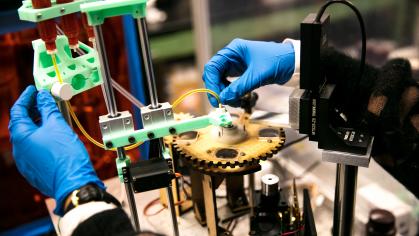Rutgers Office for Research Announces New Patent Policy

Policy will benefit innovators thanks to a more equitable revenue distribution formula
Last week, Rutgers’ Office for Research announced a new, unified patent policy that was approved and became effective retroactive to July 1, 2021. The Patent Policy was a collaborative effort between University leadership, faculty, staff, and union representatives. It will enhance efforts to support entrepreneurship and expand the innovation ecosystem at Rutgers.
Since the historic integration between Rutgers and the University of Medicine and Dentistry of New Jersey in 2013, two different patent policies have guided the University’s administration of inventions and patents, resulting in inequitable treatment of innovators and administrative units that provided the needed support to the innovation ecosystem. The new policy applies across the entire university, bringing a unified, organized, and simplified approach to managing intellectual property while providing real incentives to the inventors and support to the ecosystem that supports and enables innovation.
“Innovation is hard! It takes years of dedication, passion, hard work, and time,” said Tatiana Litvin-Vechnyak, Associate Vice President of Innovation Ventures, the Rutgers Office for Research unit responsible for the identification, protection, and licensing of innovations arising at the university. “At its core, however, are the innovators themselves, and this patent policy will reward them for their ideas and hard work. The Office for Research and Innovation Ventures will continue to serve as a key part of the support system for our remarkable innovators.”
The new patent policy features a formula for distributing the licensing revenue earned from licensing, assignment, or otherwise monetization of Rutgers inventions, with higher rewards to inventors and more flexibility for the university.
Key elements in the unified policy include:
- an equitable revenue distribution to innovators throughout all four chancellor units;
- revenue distribution to the research or academic units that support the innovation ecosystem; and
- improved support for commercialization activities such as patenting and licensing.
The policy is in line with the policies of peer institutions and includes the following revenue distribution formula:
| Inventor(s) | 35% |
| Research or Academic Unit(s) | 30% |
| TechAdvance Commercialization Fund | 5% |
| Innovation Ventures | 30% |
The formula was created following an extensive process beginning with a review of the best practices of other universities – both peer and aspirational institutions. The Office for Research held meetings and discussions with university leadership and faculty to understand what innovators are looking for and how the university could improve. Outside counsel helped merge the two existing policies and draft the new policy. Multiple meetings were held with chancellor-level leadership to review the language and solicit feedback for the ad hoc faculty advisory committee. Finally, the policy was presented to the faculty unions, working with the Senior Vice President for Research and the Office of General Counsel.
Innovation Ventures will oversee the administration of the new patent policy, which aims to support and promote innovative, universitywide endeavors consistent with the mission of Rutgers University and its guiding values of community, excellence, and clarity. The policy will also continue to ensure distribution to the TechAdvance Fund, the evergreen commercialization fund that grants innovators throughout the university to advance promising, early-stage technologies.
Under the new policy, if Innovation Ventures’ allocation exceeds the expenses necessary for commercialization activities, the surplus will be reallocated to the Chancellors and the Senior Vice President for Research. It will be used primarily to support initiatives that promote the development of our innovation ecosystem at the university, research growth, and cross-chancellor research efforts and initiatives.
“In addition to incentivizing the inventors, support for the ecosystem is critical because for the innovation to occur, in most instances, there has to be adequate infrastructure,” said Litvin-Vechnyak. “Research and innovation are very complex; driving these endeavors to successful outcomes requires significant continued investment by the university and its partners. Many steps are required, from protecting the idea to funding further research to identifying a prospective commercialization partner or creating a startup.”
Many of these aspects of the innovation process are done together with Innovation Ventures team members who are available to help manage and drive strategy around the patent prosecution process, identify and network with prospective licensees, negotiate all relevant agreements on behalf of the faculty and the university, and finally carry out years of effective alliance management after the agreement is executed to make sure that the partnership proceeds as planned. For startups, Innovation Ventures provides services to assist entrepreneurs in getting their company off the ground and beyond.
Litvin-Vechnyak continued, “This new patent policy is a tremendous accomplishment that will support entrepreneurship and expand and enhance the innovation ecosystem here at Rutgers University. We are grateful to all who contributed to this important process, and for all the input and support they provided.”



